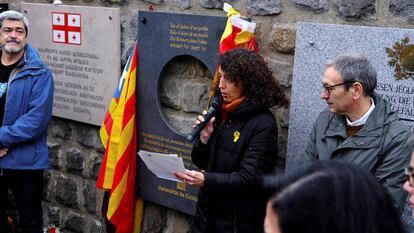Catalan official uses Mauthausen victim tribute to defend jailed separatists
Spanish Justice Minister Dolores Delgado walked out of the event at the former Nazi concentration camp, where thousands of exiled Spanish Republicans died


The Catalan regional government has used a tribute to the Spanish victims of the Mauthausen Nazi concentration camp to seek support for the jailed separatist leaders who are being tried by the Spanish Supreme Court for their involvement in the 2017 independence drive.
We are not happy that this act was taken advantage of to speak about politics
Student Elisa Lanai
The international tribute was held on Sunday to mark the anniversary of the liberation of the Mauthausen concentration camp in Austria in May 1945. Thousands of exiled Spaniards who had fought for the Republic during the Spanish Civil War were deported from France to Nazi concentration camps during World War II, most of them to Mauthausen.
Speaking at the event, Gemma Domènech, the director of democratic memory at the Catalan justice department, referred to the jailed separatist leaders as “political prisoners.” Domènech made a specific reference to Raül Romeva, the former Catalan chief of foreign affairs who placed a commemorative plaque at the Mauthausen concentration camp two years ago, when he was still still a member of the Catalan regional government.
“[Raül] Romeva has spent 440 days in prison in the sad condition of a political prisoner; sad for democracy,” said Domènech, speaking in front of the plaque. Romeva is currently facing charges of rebellion and misuse of public funds for his involvement in the events leading up to the illegal referendum on Catalan independence on October 1, 2017, and the unilateral declaration of independence that was passed in the regional parliament a few weeks later.
Domènech wore a yellow ribbon in support of the separatist leaders – even though Jewish prisoners at the Nazi camp were identified by yellow stars
Acting Spanish Justice Minister Dolores Delgado was present for the tribute but left in the middle of Domènech’s speech. “Any act of exclusion clashes head-on with the spirit that emerged from this extermination camp, where defenders of freedom died,” she said afterwards, in reference to the Catalan official’s comments.
Delgado argued that the separatist leaders are being tried “with all democratic safeguards,” adding, “We are developing a new story of historical memory that leaves nobody out, so that totalitarianism will not return and universal values will be respected, without excluding anybody.”
Delgado insisted that the tribute went “beyond nationalities. Here the human condition was denied. Here, civilization took a step backwards.”
Thousands of people from across Europe, many of them students, had come to Mauthausen on Sunday to pay tribute to the victims of the concentration camp on the anniversary of its liberation. Various associations had organized different activities within the Nazi camp, and according to Domènech, Delgado was not expected to attend the event organized by the Catalan government.
During the commemorative act, Domènech wore a yellow ribbon – a symbol of support for the jailed separatist leaders – on the lapel of her jacket. The yellow ribbon was particularly jarring in the context of the Nazi concentration camp, where prisoners were forced to sew colored stars on their clothes to identify the reason for their imprisonment – yellow was the color that identified Jews. Domènech was contacted by EL PAÍS but refused to offer an explanation for her actions.
Nearly 10,000 Spaniards were locked up in Nazi concentration camps like Mauthausen; 5,117 never made it out alive
According to EL PAÍS journalist Camilo S. Baquero, a spokesperson from the Catalan regional government said that acts like these “also serve to demand tolerance in a wide sense,” explaining that “this includes freedom of expression, the right to disagreement and the educated exchange of points of view.”
But other Spaniards at the tribute were upset by how it was used for political purposes. “We are not happy that this act was taken advantage of to speak about politics,” said Elisa Lanai, a 16-year-old Spanish student from a school in Huesca, who decided to leave with her friends when the justice minister walked out.
“The spirit goes against Mauthausen,” said Rafael Muñoz, a schoolteacher from Zaragoza, while the head of the victims association Amical de Mauthausen (Friends of Mauthausen), Enric Garriga, said he too was “upset” by how the political situation in Catalonia was mixed up in the tribute. “It was not the place or time for this,” he said.
But not everyone felt the same way. Jordi Pla, a 16-year-old student who visited the camp with his school, walked around with the Catalan pro-independence flag draped over his shoulders. Pla said the victims of the Nazis represented the fight against fascism and “that is a little bit like our independence movement.”
Nearly 10,000 Spaniards were locked up in Nazi concentration camps like Mauthausen; 5,117 never made it out alive. The victims were mostly exiled Republicans who had been stripped of their Spanish nationality by the dictatorship of Francisco Franco.
On April 26, the Spanish government approved a proposal by Delgado to establish May 5 in remembrance of the Spaniards who were deported and killed in Nazi concentration camps, and all other Spanish victims of the Nazi dictatorship.
English version by Melissa Kitson.
Tu suscripción se está usando en otro dispositivo
¿Quieres añadir otro usuario a tu suscripción?
Si continúas leyendo en este dispositivo, no se podrá leer en el otro.
FlechaTu suscripción se está usando en otro dispositivo y solo puedes acceder a EL PAÍS desde un dispositivo a la vez.
Si quieres compartir tu cuenta, cambia tu suscripción a la modalidad Premium, así podrás añadir otro usuario. Cada uno accederá con su propia cuenta de email, lo que os permitirá personalizar vuestra experiencia en EL PAÍS.
¿Tienes una suscripción de empresa? Accede aquí para contratar más cuentas.
En el caso de no saber quién está usando tu cuenta, te recomendamos cambiar tu contraseña aquí.
Si decides continuar compartiendo tu cuenta, este mensaje se mostrará en tu dispositivo y en el de la otra persona que está usando tu cuenta de forma indefinida, afectando a tu experiencia de lectura. Puedes consultar aquí los términos y condiciones de la suscripción digital.








































